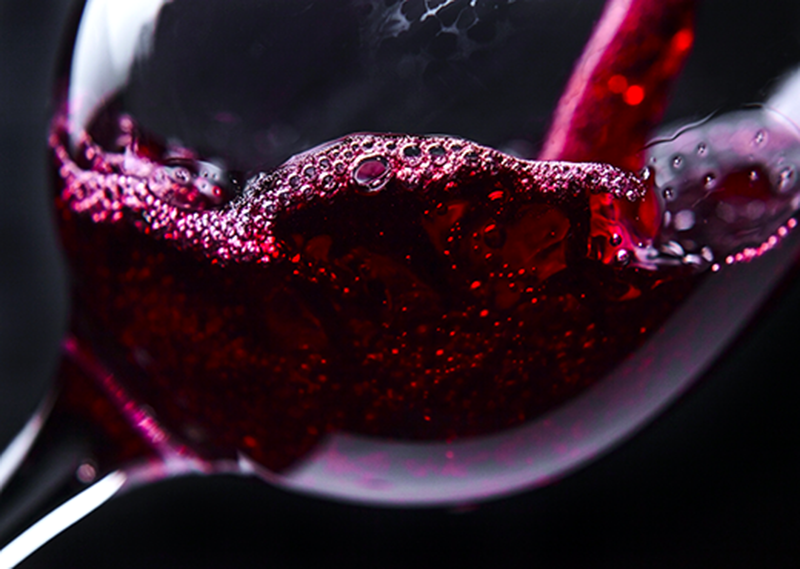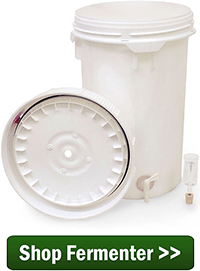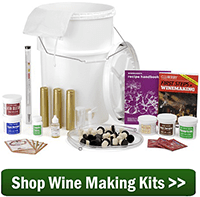 What is the going opinion of making wine with fresh grapes and crushing them, as opposed to using a wine kit? Is one better than the other by default, or would you say either method can produce excellent or horrible results?
What is the going opinion of making wine with fresh grapes and crushing them, as opposed to using a wine kit? Is one better than the other by default, or would you say either method can produce excellent or horrible results?
Phil B. – TN
_____
Hello Phil,
Thanks for bringing up this great question about wine kits vs fresh grapes. It’s a question we get from time to time, so I’ll be more than happy to answer it here…
Whether you are making wine from grapes or making wine from kits the quality of the wine starts with the quality of the grapes. There is an adage in the wine making industry that says:
“You can never make a wine that is
better than the grapes used to make it.”
What this means is that you’ll never make great wine out of poor wine grapes. The quality of the wine always starts with the quality of the grapes.
When making wine from fresh grapes the individual winemaker usually has a limited selection of grapes to choose from. Quality can suffer when dealing in the take-it-or-leave-it type of market that often arises for the home winemaker.
The quality of grapes that you will find in wine kits varies from good to outstanding. It is not in the interest of these kit producers to spend their time preparing and packaging poor wine grapes. It doesn’t make economic sense, so great care is taken to locate and acquire grapes that are above average quality.
This is one of the major advantages to using a wine kit vs fresh grapes. You are able to rely on the wine kit producer’s expertise in selecting quality grapes. So on the whole you’ll be starting with a better quality grape when using a wine kit than when obtaining grapes on your own. Of coarse, there are always exceptions. Living near a grape growing mecca such as Napa can turn this point on its head, but for most home winemakers, this is a consideration that should be given some weight.
We offer an array of different brands of wine kits. As you go up the ladder in price, the finer your selection of grape. How much you spend depends on the level of taste. Some people are completely happy with the On The House wine kits and could not tell a difference even if they did choose a more expensive kit. For others, the On The House simply would not do. How far up the ladder one goes is very much a personal choice.
 Unfortunately, quality grapes do not guarantee a stellar wine, it’s just the first requirement necessary to get there. Between the grapes and the wine bottle is a whole host of other factors such as: acidity, alcohol, sweetness, etc.
Unfortunately, quality grapes do not guarantee a stellar wine, it’s just the first requirement necessary to get there. Between the grapes and the wine bottle is a whole host of other factors such as: acidity, alcohol, sweetness, etc.
Making wine from a wine kit alleviates you from these variables. This is because all these factors have already been taken care of for you by the wine kit producers. They balance the acidity, sugar content and many other features such as clarification and oak treatment to match the typical character of the wine you are making. By eliminating as many variables as possible they are helping to insure that you will make a remarkable wine every time. This is a very valuable benefit of using wine kits vs fresh grapes – especially for the beginner.
Now having said this, I understand completely that we are talking about a hobby, and for some, part of the hobby is the passion that goes into the picking, the crushing, the pressing, and so forth. I get that. And if this is you, I completely support your efforts to make wine from the dirt to the wine bottle. I’m just trying to bring total objectivity to the consideration of using wine kits vs fresh grapes.
 So while both wine kits and fresh grapes holds their own rewards, by starting with a wine you are virtually eliminating any chance of producing a bad wine. Add to that the incredible selection that is now available to the home winemaker and it starts to become apparent that a wine kit is the way to go for the beginner.
So while both wine kits and fresh grapes holds their own rewards, by starting with a wine you are virtually eliminating any chance of producing a bad wine. Add to that the incredible selection that is now available to the home winemaker and it starts to become apparent that a wine kit is the way to go for the beginner.
I hope this covers all your questions and curiosities about wine kits vs fresh grapes. Please realize that regardless of which path you decide to take, we will be more than happy to help you in any way you need.
Best Wishes,
Ed Kraus
—–
Ed Kraus is a 3rd generation home brewer/winemaker and has been an owner of E. C. Kraus since 1999. He has been helping individuals make better wine and beer for over 25 years.

What would you say are the 3 most important things in choosing grapes and how important is the grape’s brix score? I planned on making Sangiovese wine this year but it’s 23.5 brix score (according to my refractometer) was lower than the Zinfandel’s 25 so I bought that instead. I thought a grape’s sugar content was it’s most important quality. Just an FYI: the grapes I usually get are from the Lodi area of the California valley.
Robert, we would consider the pH, total acid and brix to be the 3 most important things to consider when choosing grapes. Below we have supplied the link to an article that is a 4 part series on knowing when to pick grapes. They will provide much of the information that you are looking for.
When To Pick Grapes
http://www.eckraus.com/blog/picking-when-to-pick-the-winemakers-first-decision-part-1
I would like to take some exception to the following statement from this article:
What this means is that you’ll never make great wine out of poor wine grapes.
I will agree that the better the starting ingredients, it is more likely the wine will end up better (assuming the wine maker didn’t mess it up).
Sure it is easy to make good wine out of good grapes. However when the grapes do not come in at the exact specs you would want, the skill and creativity of the wine maker comes into play. Sure if you have moldy, rotten, contaminated, etc. grapes, the chances go way down the wine will be “great.” But if acid and sugar are a little out of specs, these can be adjusted and the wine can still be great. A wine kit will make wine for what it is. Sometimes great and sometime rather mediocre. There is more flexibility with fresh fruit for a skilled wine maker.
Sure kits are handy and you can make them any day of the year. But if you want to be a “real” winemaker you just want to get your hands in grapes at least a few times per year.
Hi Ed, I found your article to be spot on. I am a hobbyist wine maker for about 5 years now. I am also a moderately knowledgeable wine drinker. I am not a professional by any means but could probably taste a wine and get the price point 90 95 prevent of the time. I mostly make country fruit wines now because of what you mentioned in the article above. I currently do not have access to good grapes. I have made 3 kit wines now. They were low, medium and high quality kits and not from your company. None of these were better than 10 dollar wines, which is ok cuz they only cost 3 to 5 dollar per bottle to make but that leaves a lot of low quality wine to drink. I am looking for a 30 dollar quality of wine. Do you think I could achieve this with a kit wine.? If so please recommend a Cab or Sangiovese fire me to experiment with. I promise to meticulously follow directions
Steve, the highest quality kits we carry would be the 16 and 18 liter kits. We cannot say what the equivalent per bottle cost would be but they are our highest quality wines. Below are the links for product and pricing information.
18 Liter Kits
https://eckraus.com/wine-ingredients/wine-juice-concentrates/?_bc_fsnf=1&Shop+By+Size=18+Liters+And+Up&Brands=Cellar+Craft+Showcase+Collection
16 Liter Kits
https://eckraus.com/wine-ingredients/wine-juice-concentrates/?_bc_fsnf=1&Shop+By+Size=16+Liters
Personally, I never liked wine from wine grapes. I like wild grapes that grow in my area in North Georgia. This is the reason I started making my own wines. I make mostly Country Wines from locally grown fruits. I use locally grown berries, or frozen juices, and sometimes dehydrated fruits. I have even used wild crabapples, (they make an excellent wine)
The kits I have used, to me, have an artificial flavor that takes away from the enjoyment of the finished products.
Most people say my “homemade” wines are far superior to those available in the stores.
My main concern is in the cost. I’m in my late 70’s and on a fixed income, so I recycle bottles, and look for “free shipping.” I look for sugar on sale and use used 5 gallon water containers for some of my carboys. Occasionally, I see a flavor in a kit I have not tried and order one. I also buy commercial wines to compare, this keeps me on my toes.
thanks for your website, 0i get lots of tips and supplies from it.
Ed, in the fall I have the opportunity to buy wine “juice” directly from a California vineyard. The juice come in 6 gallon buckets and when it arrives the natural yeast in the juice is starting to work – the bucket relief valve is sometimes spurting away. Should I try and stop the natural yeast then add commercial yeast or just add commercial yeast? Also, what do you suggest to be added as a clarifier?
Thanks in advance for your help!
Wes, We always recommend using wine yeast instead of letting wild yeast ferment. The problem is that along with wild yeast, you can have bacteria, mold spores and other things to spoil the wine. You can add sulfites, wait 24 hours and add wine yeast. For more information see the article posted below. As for the clarifying agent, you can try either our Speedy Betonite or Kitosol 40.
Why Should I Use Wine Yeast
https://eckraus.com/why-should-i-use-wine-yeast/